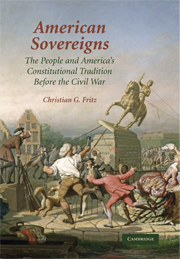Book contents
- Frontmatter
- Contents
- Acknowledgments
- 1 Prologue
- PART ONE THE PEOPLE'S SOVEREIGNTY IN THE STATES
- PART TWO THE SOVEREIGN BEHIND THE FEDERAL CONSTITUTION
- PART THREE THE STRUGGLE OVER A CONSTITUTIONAL MIDDLE GROUND
- 8 The Collective Sovereign Persists: The People's Constitution in Rhode Island
- 9 Epilogue
- Key to abbreviations
- Notes
- Selected Short Titles
- Credits
- Index
8 - The Collective Sovereign Persists: The People's Constitution in Rhode Island
Published online by Cambridge University Press: 31 January 2011
- Frontmatter
- Contents
- Acknowledgments
- 1 Prologue
- PART ONE THE PEOPLE'S SOVEREIGNTY IN THE STATES
- PART TWO THE SOVEREIGN BEHIND THE FEDERAL CONSTITUTION
- PART THREE THE STRUGGLE OVER A CONSTITUTIONAL MIDDLE GROUND
- 8 The Collective Sovereign Persists: The People's Constitution in Rhode Island
- 9 Epilogue
- Key to abbreviations
- Notes
- Selected Short Titles
- Credits
- Index
Summary
During the morning of May 3, 1842, an “immense influx” of out-of-town visitors mingled with local townspeople to witness a special event in Providence, Rhode Island. The occasion was the inauguration of a new governor and legislature for the state. A procession of sixteen hundred people (some estimates put the number at three thousand) gathered in High Street, in front of Hoyle's Tavern. The gathering included recently elected officials and was led by a series of militia companies and “Volunteer corps” from around the state. The Providence Brass Band provided music. Bringing up the rear on horseback “two abreast” were members of different trades, such as the butchers, who in “white frocks” made “a very imposing appearance.”
Spectators and celebrants “thronged the sides of all the avenues” staring at “the novel sight.” They strained to catch a glimpse of the “immense assemblage” as it moved toward the State House, where the inauguration was supposed to take place. Even the most conservative estimates placed the number of those present at more than 20 percent of the city's population; others thought it exceeded 40 percent.
The inauguration prompted special attention because the state already had a governor and legislature. The existing government traced its authority to Rhode Island's colonial charter, which had served as the state's constitution since the Revolution. The 1663 charter permanently fixed the number of representatives each town could send to the legislature, despite significant shifts in later patterns of population growth in the towns.
- Type
- Chapter
- Information
- American SovereignsThe People and America's Constitutional Tradition Before the Civil War, pp. 246 - 276Publisher: Cambridge University PressPrint publication year: 2007

